- Home
- T. J. English
American Gangsters
American Gangsters Read online
American Gangsters
A True Crime Collection
T. J. ENGLISH
CONTENTS
WHITEY’S PAYBACK
Introduction
I. BULLET IN THE ASS
1. The Wiseguy Next Door — Playboy, April 1991
2. Rude Boys — Playboy, October 1991
3. Hong Kong Outlaws — Playboy, June 1992
4. Cosa Nostra Takes the Big Hit — Playboy, September 1992
II. AMERICAN DREAM, AMERICAN NIGHTMARE
1. Cain and Abel in the Skin Trade — Esquire, June 1991
2. Slaving Away — Village Voice, February 5, 1991
3. Forget it, Jake, It’s Chinatown — Village Voice, February 28, 1995
4. Who Will Mourn George Whitmore? — The New York Times, October 13, 2012
III. NARCO WARS, AT HOME AND ABROAD
1. Dope — Playboy, December 2009
2. Narco Americano — Playboy, February 2011
IV. THE BULGER CHRONICLES
1. Whitey’s Payback — Newsweek, September 19, 2011
2. The Man Who Saw Through Whitey — The Daily Beast, January 27, 2012
3. The Unlikely Moll — The Daily Beast, March 14, 2012
4. Whitey’s Women — The Daily Beast, June 11, 2012
5. The Scapegoat — Newsweek, June 25, 2012
6. R.I.P. Teresa Stanley — TJ-English.com, August 26, 2012
Epilogue
Acknowledgments
THE WESTIES
Acknowledgments
Prologue
Part I
1: The Ghosts of Hell’s Kitchen
2: Last of a Dying Breed
3: Jimmy Sows His Oats
4: Mickey
5: Poetic Justice
Part II
6: No Corpus Delicti, No Investigation
7: Doin’ Business
8: West Side Story
9: Linguini and Clam Sauce
10: Having a Drink on Whitey
11: The Feds and Little Al Capone
12: The Westies, Once and for All
Part III
13: Bad Blood
14: Betrayal
15: In the Interest of Justice
16: Mickey’s New Friends
17: What Goes Around, Comes Around
Epilogue
Afterword
BORN TO KILL
Acknowledgments
Prologue
PART ONE
The Gang
PART TWO
The Investigation
Epilogue
Sources
Index
About the Author
WHITEY’S PAYBACK
And Other True Stories
Gangsterism, Murder, Corruption, and Revenge
CONTENTS
Introduction
I. BULLET IN THE ASS
1. The Wiseguy Next Door — Playboy, April 1991
2. Rude Boys — Playboy, October 1991
3. Hong Kong Outlaws — Playboy, June 1992
4. Cosa Nostra Takes the Big Hit — Playboy, September 1992
II. AMERICAN DREAM, AMERICAN NIGHTMARE
1. Cain and Abel in the Skin Trade — Esquire, June 1991
2. Slaving Away — Village Voice, February 5, 1991
3. Forget it, Jake, It’s Chinatown — Village Voice, February 28, 1995
4. Who Will Mourn George Whitmore? — The New York Times, October 13, 2012
III. NARCO WARS, AT HOME AND ABROAD
1. Dope — Playboy, December 2009
2. Narco Americano — Playboy, February 2011
IV. THE BULGER CHRONICLES
1. Whitey’s Payback — Newsweek, September 19, 2011
2. The Man Who Saw Through Whitey — The Daily Beast, January 27, 2012
3. The Unlikely Moll — The Daily Beast, March 14, 2012
4. Whitey’s Women — The Daily Beast, June 11, 2012
5. The Scapegoat — Newsweek, June 25, 2012
6. R.I.P. Teresa Stanley — TJ-English.com, August 26, 2012
Epilogue
Acknowledgments
WHITEY’S PAYBACK
“Obviously crime pays, or there’d be no crime.”
—G. Gordon Liddy
Watergate burglar
Introduction
Joseph “Mad Dog” Sullivan is a tough mammy jammy. Gangster, killer, fugitive from the law, prison inmate: Sullivan, seventy-three, has lived a life in the darkest corners of the known world. He is a hard man who has withstood the primordial dictates of crime and punishment, and he has done so without complaining. But by the fall of 2011—after a long career as a professional hit man for the Mob; after a lifetime highlighted by numerous escape attempts from penal institutions (some successful, some not so successful); after having been hunted down, shot at, captured and locked up—the clock is finally winding down for Mad Dog.
In year thirty-one of a life sentence, Sullivan’s mortality loomed like the black raven that occasionally flew over the prison yard, sending a ripple of doom through the hearts of inmates. Recently, Sullivan had been treated for prostate cancer. During preliminary examinations, doctors determined that cancer had also developed in his right lung. Within weeks, he had half a lung removed. And still he wasn’t out of the woods. Doctors suspected that the cancer had metastasized, that it was possibly in remission but could reemerge at any time to spread through his body like a raging wildfire.
Despite the dire prognostications, on this particular day Sullivan is in good spirits. He feels as though he’s had a good run and mostly held up well against astounding odds. Never mind that fifty of his seventy-three years on the planet were spent in some form of incarceration. He feels lucky to be alive.
“It’s kind of a miracle,” Sullivan says in the visiting room at the Sullivan County Correctional Facility in upstate New York. “I should have been dead a long time ago.”
I had been summoned to meet Mad Dog by the man himself. Through a mutual contact who had interviewed Sullivan and produced a cable television documentary about his life, I was told that he wanted to meet me. I had written two nonfiction books in which Sullivan’s criminal exploits were prominently featured, and Joe was curious to know how I’d learned so much about him and the world he inhabited. Said the filmmaker: “He admires your work. He says you’re one of the few people who got it right.”
I was flattered and hesitant in equal measure. It has been estimated by law enforcement authorities that Sullivan, as a contract killer for the Mob, murdered somewhere between twenty and thirty people. What if Joe was not happy with me? Not only had I described some of his criminal exploits for the first time ever in a book, but, in my research for Paddy Whacked: The Untold Story of the Irish American Gangster, I’d even gotten hold of a manuscript of his unpublished memoir entitled Tiers and Tears. I quoted passages from the manuscript without ever asking Sullivan’s permission—though I did cite the manuscript and made it clear it was Sullivan’s writing. Even so, what I’d done was possibly an infringement of his rights; he had a good reason to be pissed off.
Knowing that he was safely locked away in prison, I could have ignored Sullivan’s request for a meeting, but I felt that I owed him the courtesy. I had written about him and characterized his criminal career in print, and quoted from his writing without his consent. Plus, I was curious. Mad Dog Sullivan was a legend in New York crime circles, the last of a dying breed, an old-school, professional hit man for the Mob. I wrote Sullivan a letter to make sure he wasn’t mad at me. When he answered that he was not, we made arrangements to meet at the prison.
For anyone with a professional interest in the criminal justice system—whether a cop, a lawyer, a parole officer, a judge, or a crime journalist—enter
ing a penal institution is akin to descending into Dante’s ninth ring of hell. Prison is, metaphorically speaking, the asshole of the universe. Many stories of the criminal life end up here, or in a cemetery, or in the witness protection program. Short of death, prison remains the great equalizer.
In the receiving room, you are stripped of all personal belongings, patted down, pockets emptied out. As you enter the facility, much like an inmate, you must be accompanied by a guard at all times. The automated bars slam shut behind you, and others open in front of you. You enter, and those gates also slam shut. As you descend deeper into the facility, you feel the free world slipping away like overcooked meat falling from the bone. You are passed from one armed guard to another, until you are ushered into the visiting room, which is also monitored by armed guards.
“I thought you might be upset with me,” I said to Joe Sullivan, once we’d shook hands and sat down at a cafeteria-style table off in a corner of the room. “Having written about you,” I continued, “quoted from your memoir, I thought you might want to wring my neck.”
Sullivan smiled. “Hell no,” he said. “What you wrote was accurate. In a way, I was proud, because you wrote about me like I was a historical figure.” The aging gangster shrugged: “Who cares? All of that is the past. I can’t change what happened. And there’s no point in hiding it, because I’m never getting out of here anyway.”
Sullivan and I had a lot to talk about. In his heyday in the criminal underworld, Mad Dog had been involved in some key events that I chronicled in my work, and I was fascinated to hear the details from his point of view. In the same regard, I had information and thoughts about certain events and people that Sullivan wanted to know about. Mad Dog regaled me with stories from his life of crime that were riveting and sometimes humorous. He told me how he escaped from Attica prison in 1971, the only man in history to ever do so. He told of meetings with Anthony “Fat Tony” Salerno; John Gotti; Jimmy “the Gent” Burke, of Goodfellas fame; and many other notorious mobsters. Joe had the Irish gift of storytelling. He was also a great conversationalist. He listened to my thoughts and observations with great attention to detail. Though he was a man with little formal education, he possessed a sharp intelligence, and the hyperawareness and street smarts of a true hustler. He was friendly, respectful, convivial.
“Call me Sully,” he said, after we’d been talking awhile. And that’s when it hit me.
Nice guys make the best killers.
Joe Sullivan was a nice guy. He had the charm of a talkative cab driver, or a friendly bartender who has a talent for getting people to relax and unburden themselves. If you ran into him at a saloon or tavern, he was the kind of stranger who, over beers at the bar, would quickly and effortlessly draw you into a conversation, getting you started but then gladly letting you do most of the talking, asking interesting questions, making jokes and observations, loosening you up with the skill of a psychiatrist. Before long, you’d feel like Sully was an old friend. You’d be revealing things about yourself you didn’t normally tell anybody, much less a complete stranger. Sully would also tell you stories, have you crying and laughing and listening in wonder. You’d want to match him yarn for yarn, to make him smile the way he made you smile. He’d say, “Sorry, I didn’t catch that.” So you’d lean in closer to tell him a particularly juicy detail or to deliver a punch line. And at that moment, without you seeing or noticing anything, Sully would whip out a gun, put it to the back of your head and blow your brains out.
I never set out to be a crime writer. In the mid-1980s, when I began my career as a journalist, I covered the waterfront, so to speak. As a freelance writer in New York City, driving a taxi at night to pay the bills, I was engaged in the classic American hustle. Back then, you could do it. You could live close to the bone and cover your bills while pursuing your craft, whether it was acting or filmmaking or painting or writing. To make any money at it, you had to maximize your talent and push the envelope. And so, as an aspiring journalist, I wrote about many subjects, including politics, sports, entertainment, and crime.
More and more, I came back to the subject of crime—not arbitrary crime, or so-called crimes of passion—organized crime, crimes set against a backdrop of sociology, ethnicity, culture, economics, and politics. Through the writing of many magazine articles and five nonfiction books, I have been covering this beat, off and on, for close to twenty-five years.
Given my chosen profession, I am sometimes asked, “What attracts you to the dark side?” I have a hard time identifying with this question. I do not write about serial killers, or psychological aberrations, or vampires, or zombies. Mostly, I write about crime as an extension of the American social and economic system. I write about the underbelly of capitalism, men and women attempting to manipulate the system to their advantage, and law enforcement’s attempts to bring justice to this process. Sometimes, people in law enforcement are players in this underworld. They frame innocent people who they think deserve it, or attempt to manipulate a given situation to their advantage, driven by the desire for financial gain or career advancement or the esteem of their peers.
The world is a messy place. Ever since Adam and Eve were chased out of the Garden of Eden, we have known this to be true. It is the job of elected officials, civic leaders, and parents to promote the illusion that life is fair, people are good, and the world is an orderly place; our daily lives at home, school, or on the job are designed to lend credence and support to this illusion.
The journalist’s job is to drag this fantasy out into the light of day, to pull back the curtain and make sense of what seems chaotic and difficult to explain.
I am not attracted to the dark side. I am attracted to the light, and what that light reveals about the true nature of the social universe.
The various articles in this collection were written over a twenty-two-year period. They reflect my interest in crime as a vast ecosystem, a parallel universe to the social and economic system we observe in the upperworld on a daily basis. The way I see it, one cannot exist without the other. In the United States, business, politics, and crime are frequently intertwined. What is happening below the surface shapes the world as we know it. What is presented to the public is occasionally wrapped in bullshit and lies.
For me, these collected articles are all basically about one thing: the pursuit of the American Dream. To the reader, the question is posed: How far would you go to achieve power and prosperity for you and your own? Some people, out of free will, dire circumstances, or temporary insanity, make choices that take them to the wrong side of the law. Chronicling the path of misguided souls and devious minds has become a big part of my calling as a writer.
It is worth noting that the pieces in this anthology were written for a variety of publications, and that I have never been under the employ of a particular magazine or newspaper. My status as a freelance writer, I like to believe, affords me a certain degree of independence. I am not peddling a specific ideology, nor do I represent the views of an established publication like, say, Esquire or the New York Times. Even though I have written for these periodicals, I have never been urged to adhere to a particular editorial point of view. I have never been pigeonholed in that way. My reporting is my own, and my point of view, when there is a need to assert it, is a consequence of my research and not an editorial dictate from above.
Creatively and spiritually, I am nurtured by the work. And the kind of reporting I enjoy most has to do with traveling to locales that serve as the setting and/or incubation chamber for the kinds of criminal activity I write about.
For a crime journalist, there are few undertakings more invigorating than traveling into a city—say, Kingston, Jamaica, or Hong Kong, or Ciudad Juárez, Mexico—in search of a good story. The trip must be planned with near-surgical precision. If you know what you’re doing, some important interviews will have been set up ahead of time, so that you come into town and hit the ground running. You travel light, dress unobtrusively, carry little more tha
n some research material, a notepad, a tape recorder, a laptop. You stay somewhere downtown in an anonymous hotel, a Holiday Inn or something similar. You circulate without calling attention to yourself, talking with people on all sides of the law, playing dumb, if necessary, to get what you need. You profess to have no ideological agenda, and hopefully you do not, for to tip your hand one way or the other can quickly rile passions and create untenable situations. You get what you need and then get the hell out of town as quickly as possible. Hopefully, the sources you have spoken with think little of your visit until after they see your article in print and react accordingly.
I do not whack people, but I can’t help but think that what I do on these assignments is akin to being a hired assassin. You arrive from out of town as a mysterious stranger. Every move you make, every conversation you have, is geared toward a specific goal. The task at hand is to accomplish what you came for cleanly and professionally, and then—poof—disappear in a cloud of smoke.
Seated in the prison visiting room in upstate New York, Mad Dog Sullivan smiles at my analogy. He finds it cute. The idea that a writer’s gathering information and putting words down on paper is in any way similar to the actions of a professional hit man is the kind of literary prestidigitation that brightens his day. Sullivan knows about high-intensity assignments that leave people scratching their heads, wondering what happened. But he also knows that the end result of his line of work is a dead body and shattered lives. “I belong in here,” he says, “no doubt about that. If they were to give me the death penalty, I can’t really argue with that, either, even though I don’t want to die.”
The immorality of Sullivan’s actions is clear, but this does not stop the hit man from taking pride in his work. And this is where Sullivan and I sense a kinship, a mystical connection that can sometimes exist between a writer and his subject, no matter how contrary may be their backgrounds, lives, or daily existence. Sully and I come together out of a shared appreciation of craftsmanship.
Believe it or not, Mad Dog always operated within a personal code. For one thing, he has never been a rat. Many times since he began his most recent period of incarceration in 1981, he has been approached by federal agents and prosecutors offering him some kind of deal if he would testify against organized crime figures for whom he worked. Sullivan’s response has always been the same: “Go fuck yourself.”

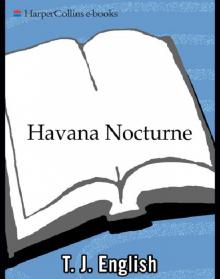 Havana Nocturne
Havana Nocturne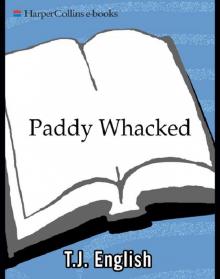 Paddy Whacked
Paddy Whacked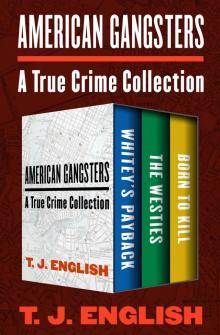 American Gangsters
American Gangsters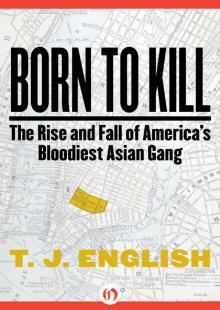 Born to Kill
Born to Kill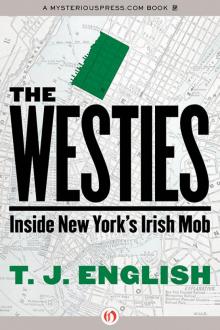 Westies
Westies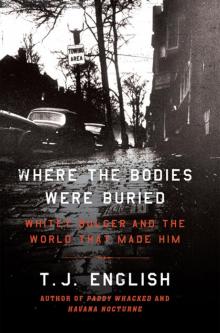 Where the Bodies Were Buried
Where the Bodies Were Buried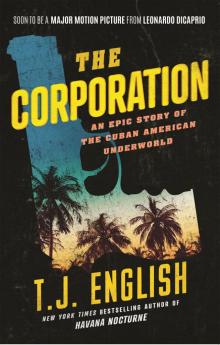 The Corporation
The Corporation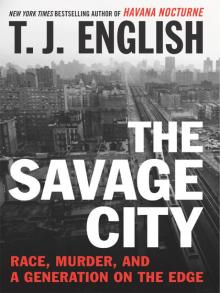 The Savage City
The Savage City